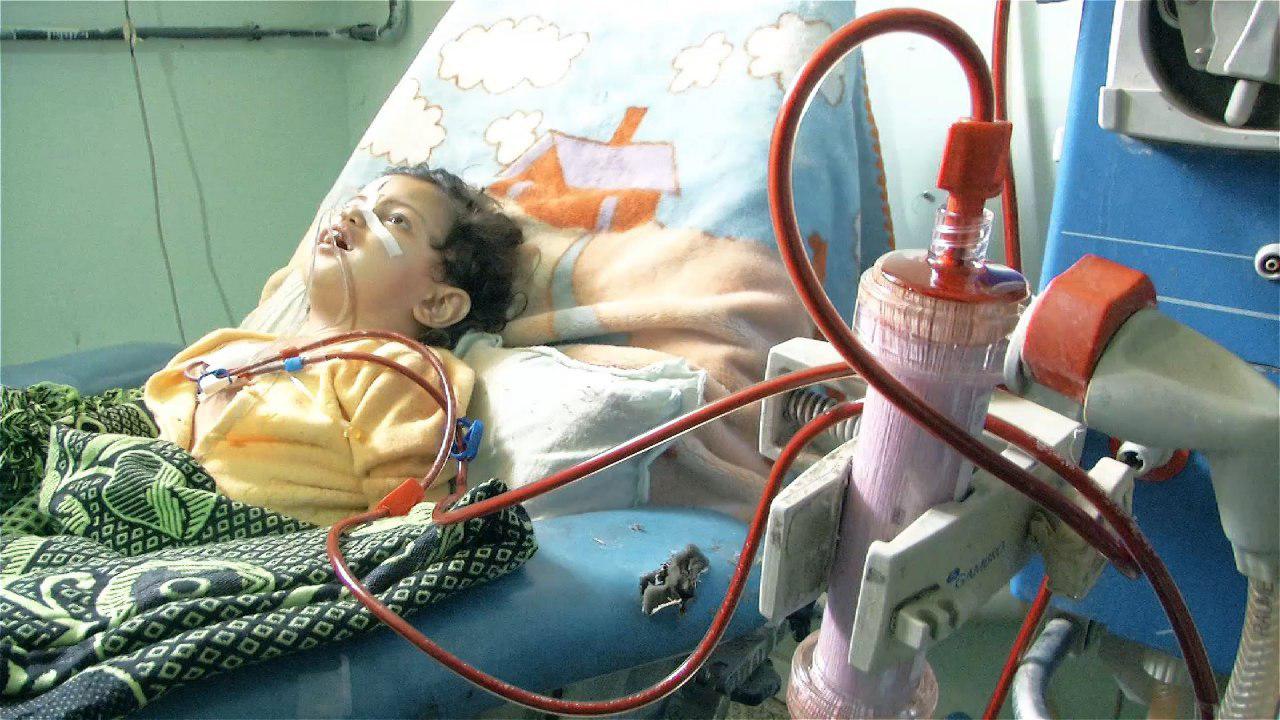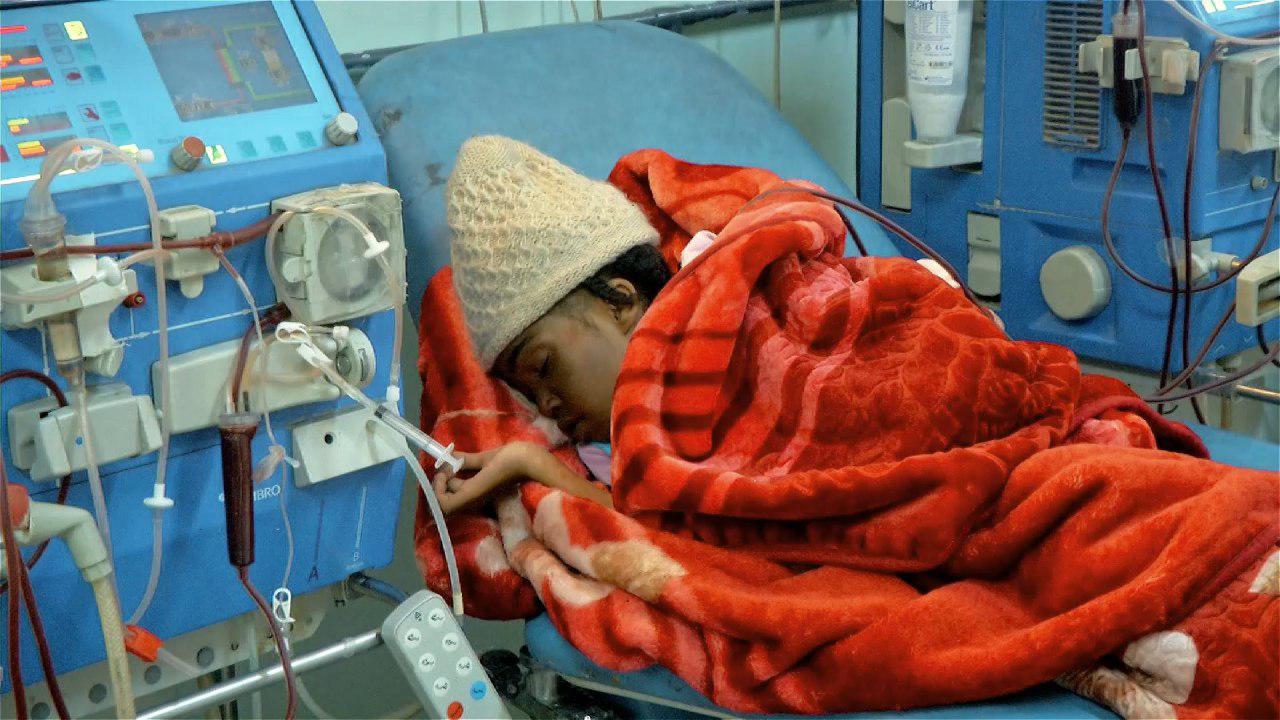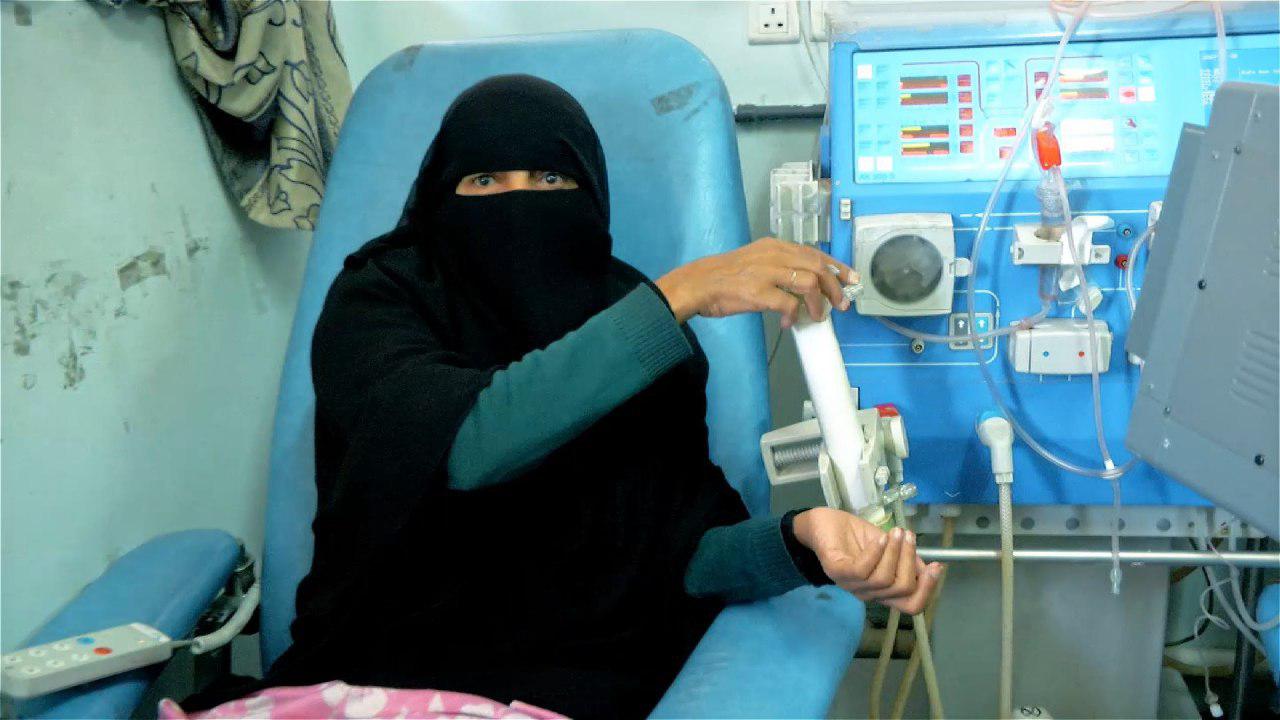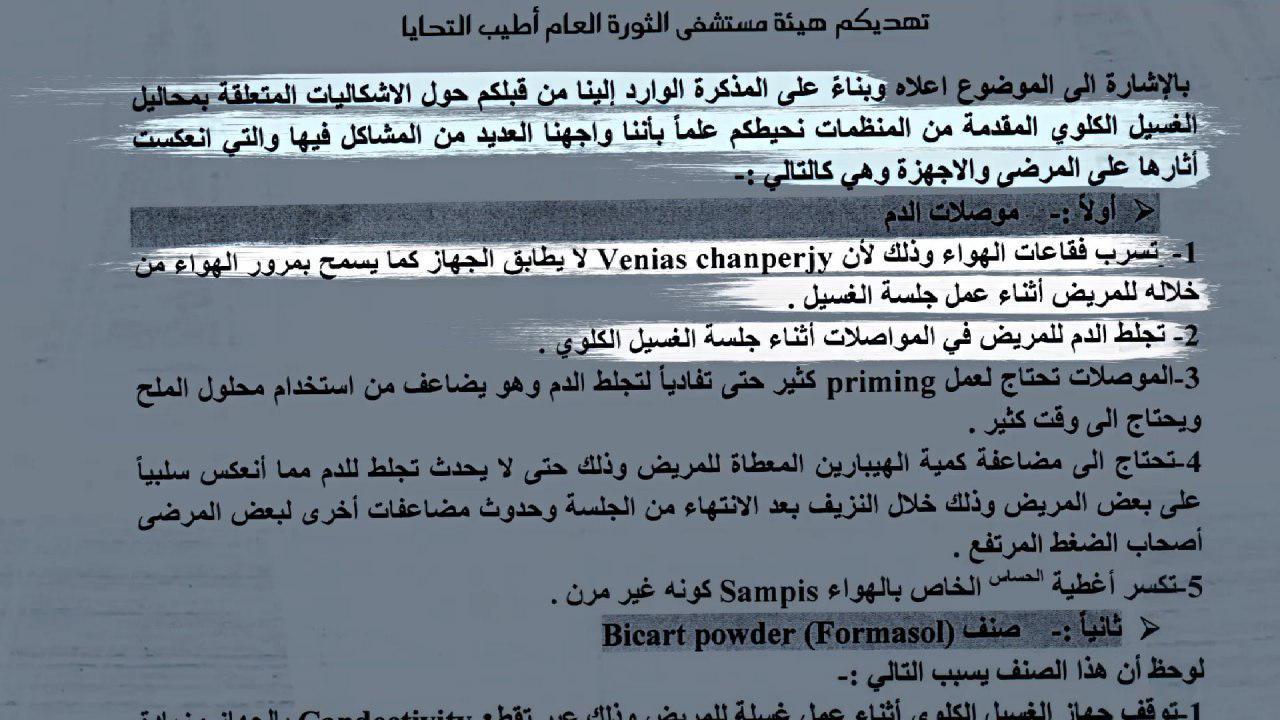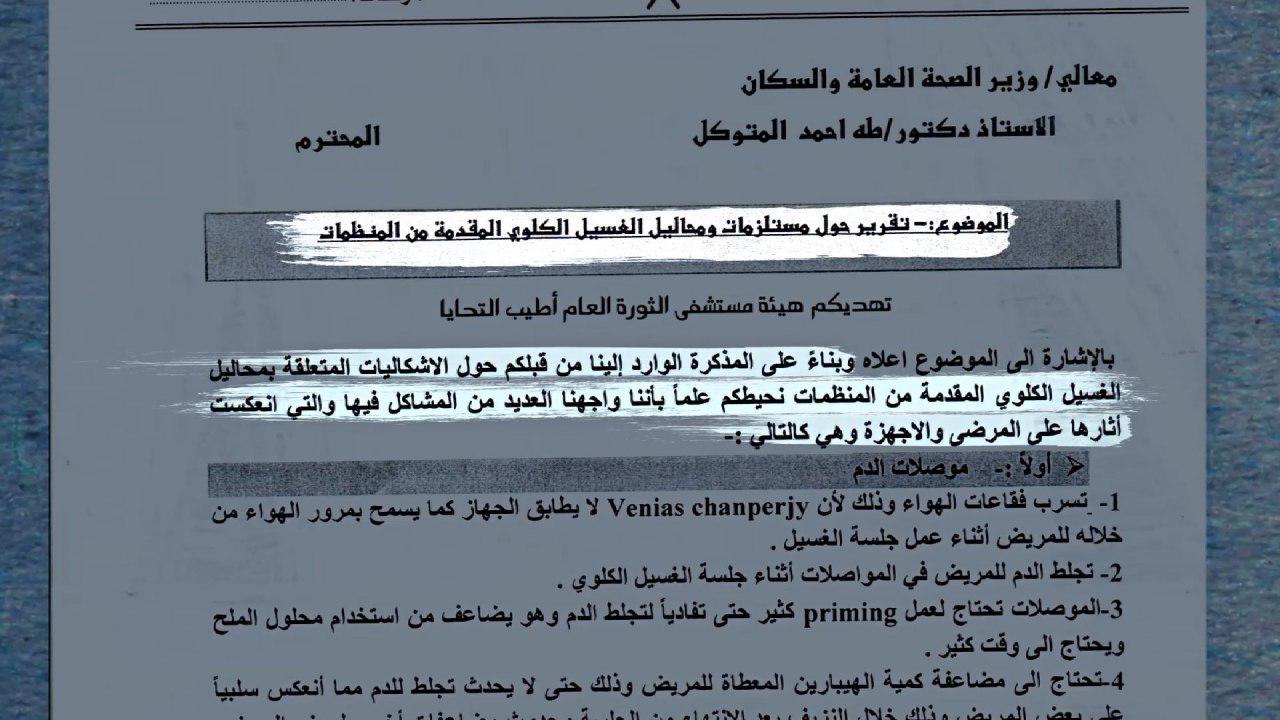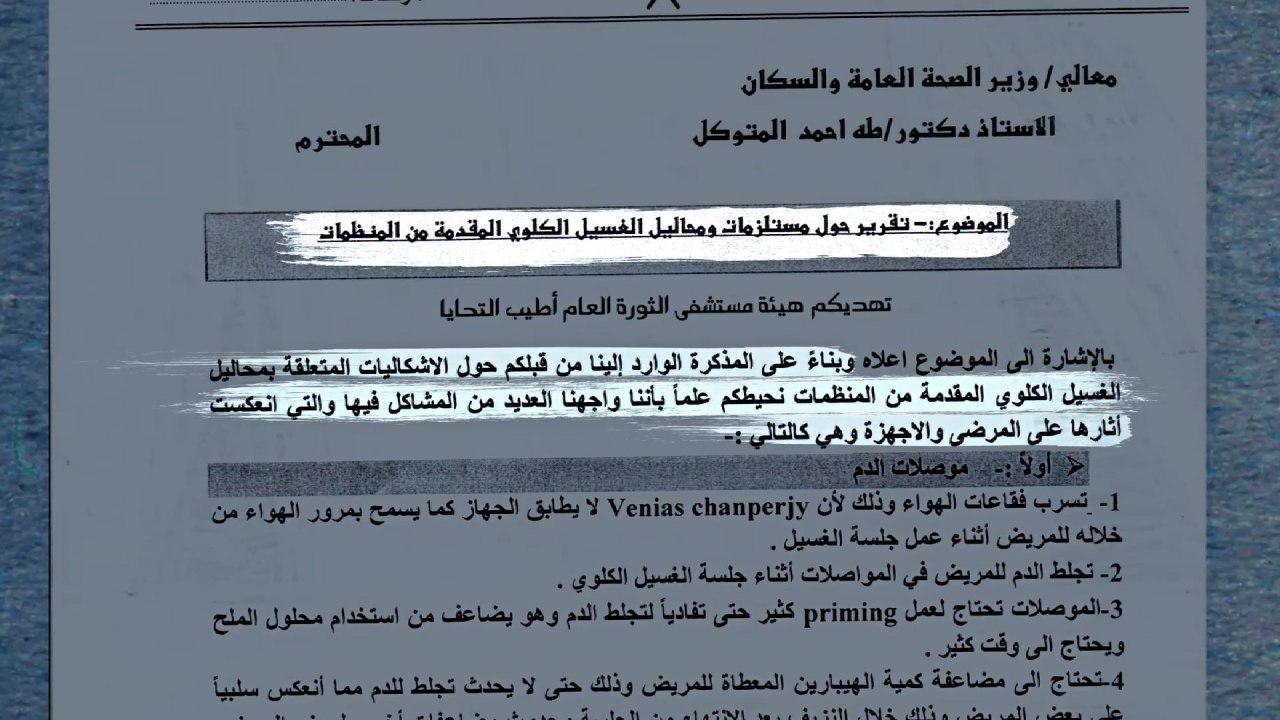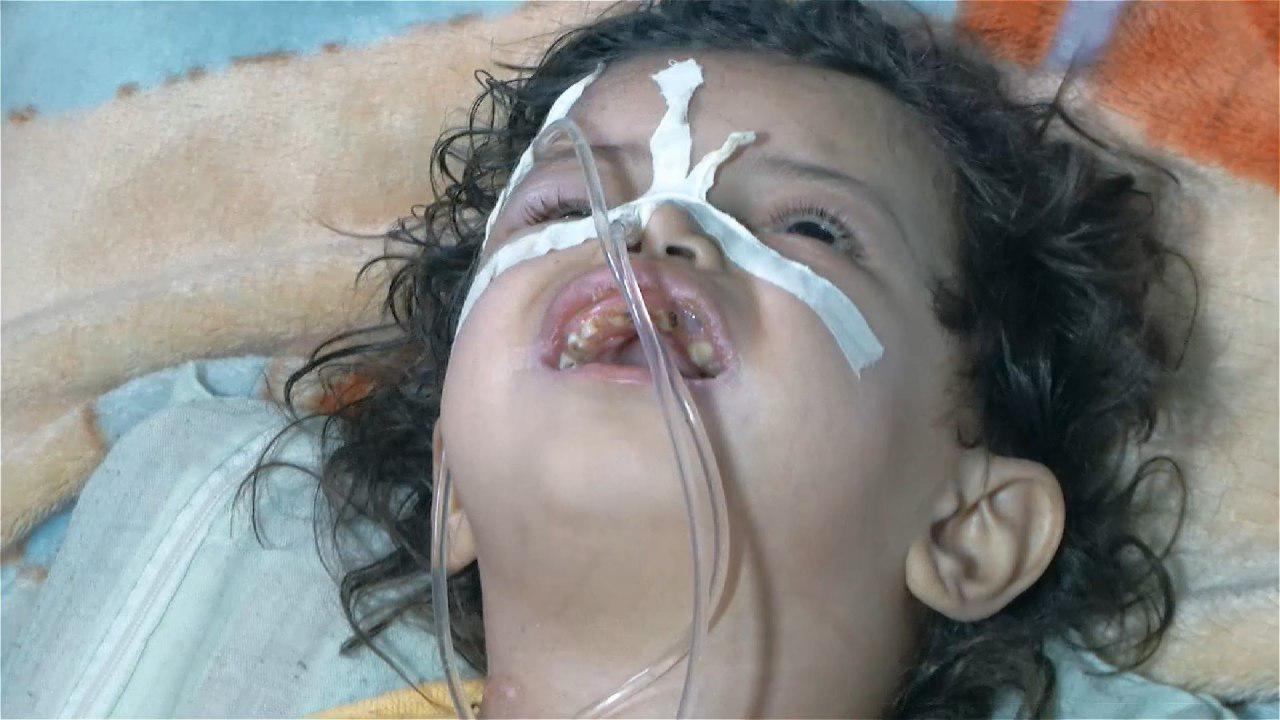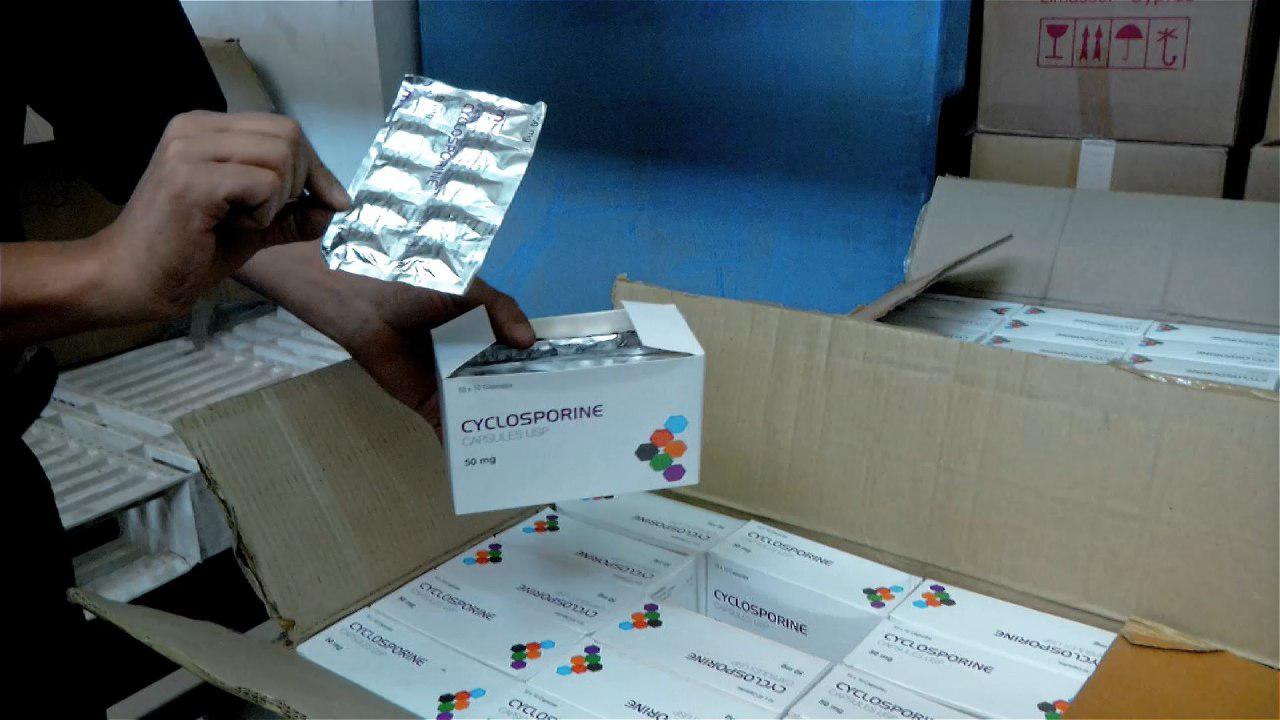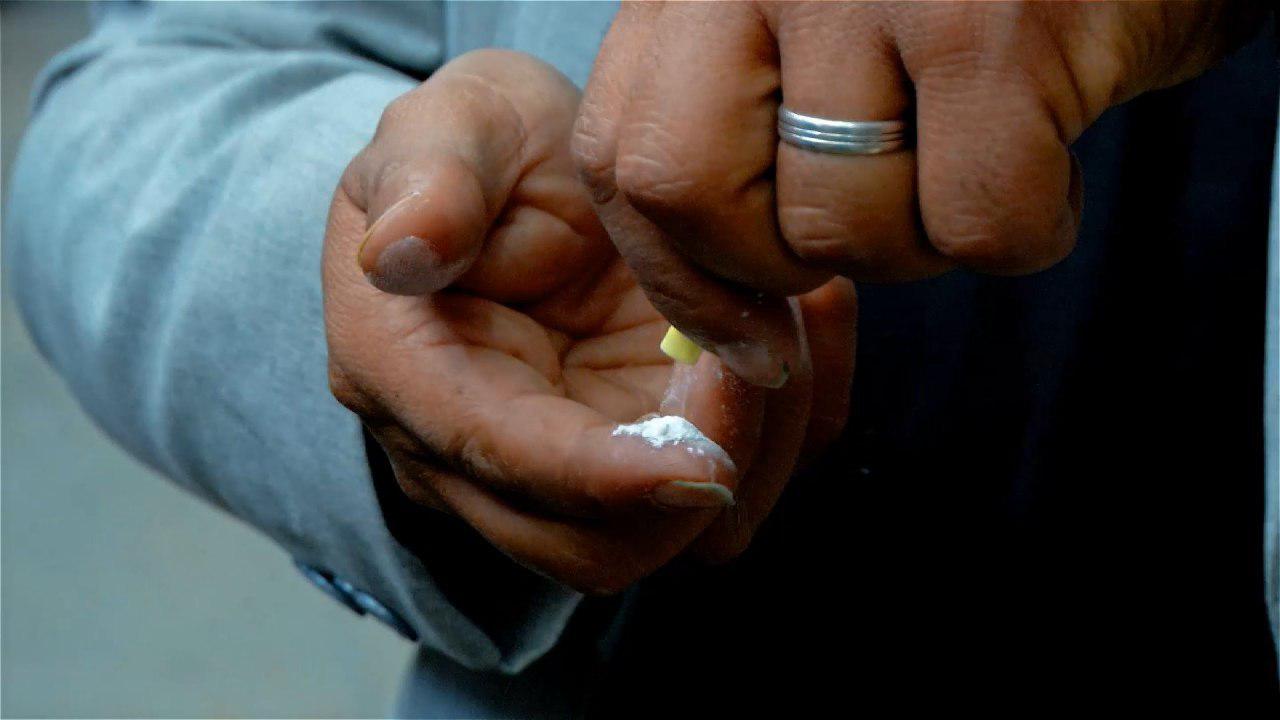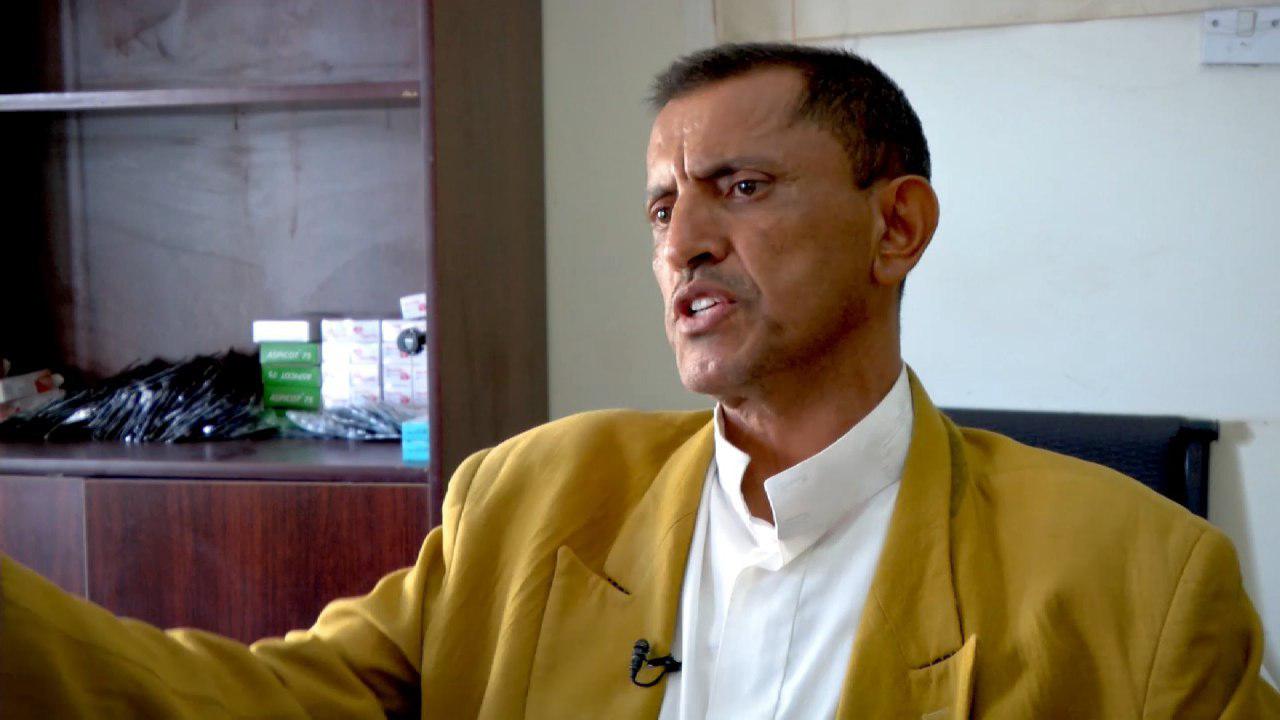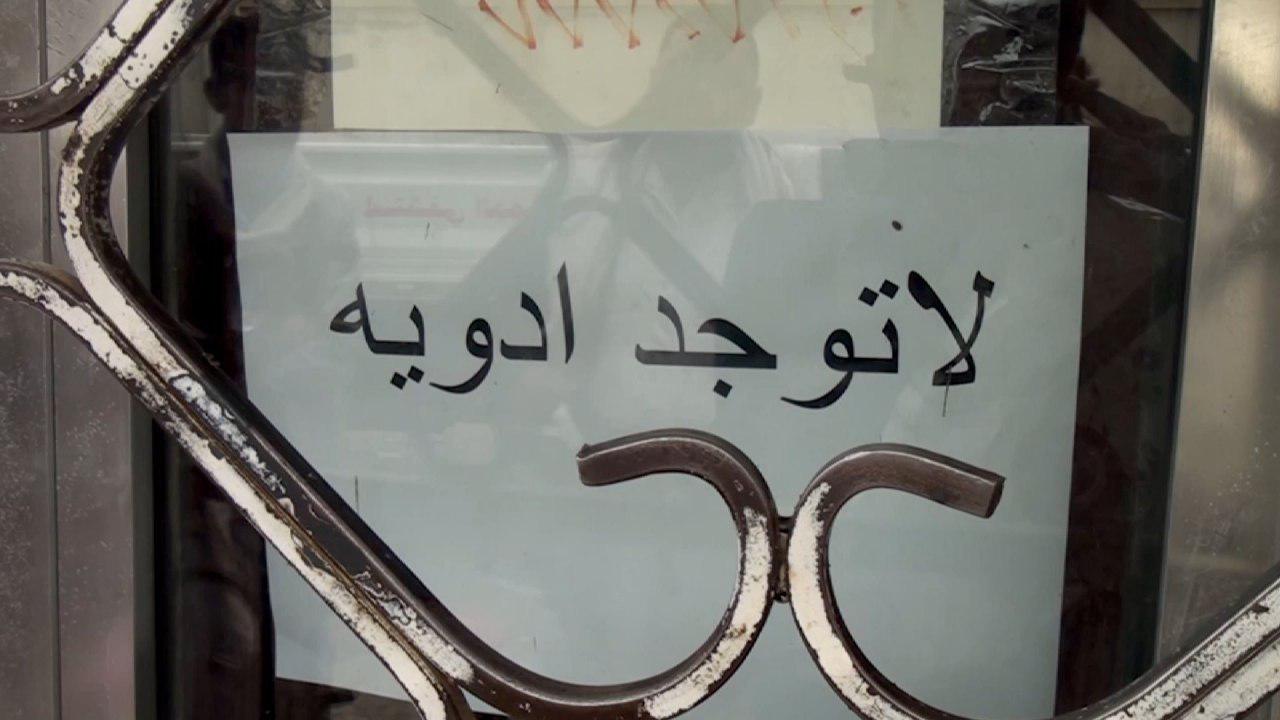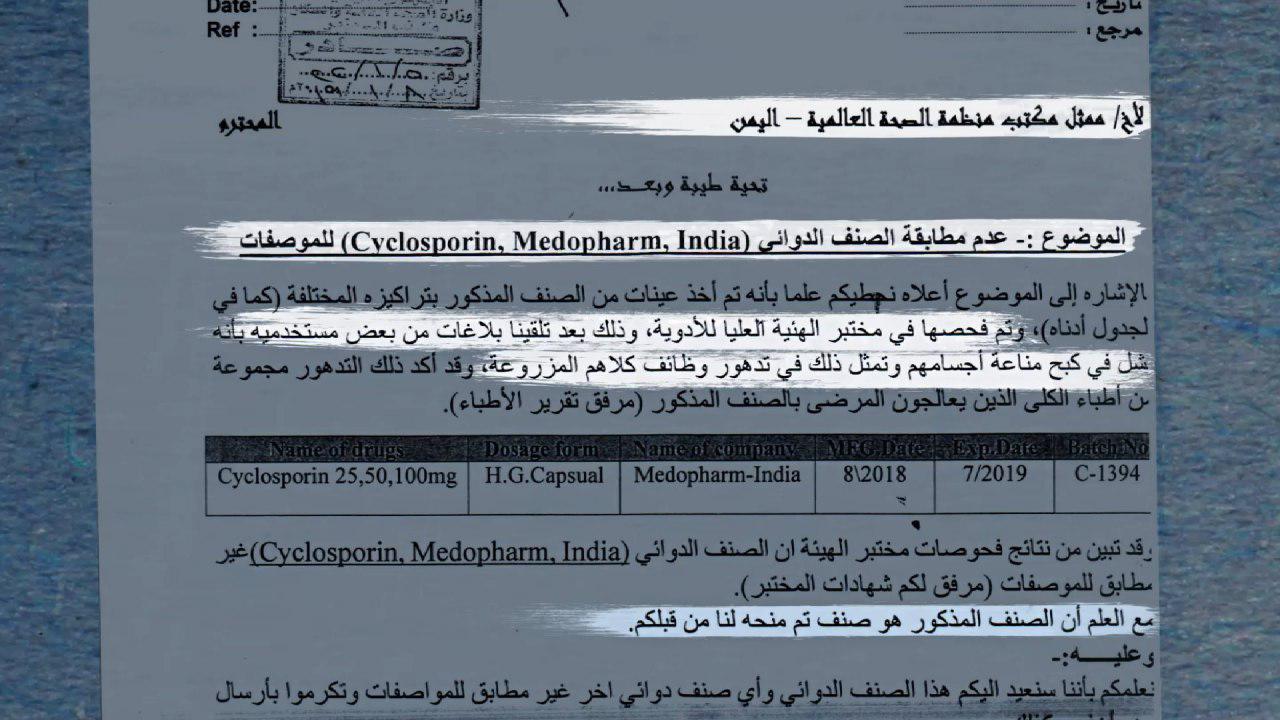Investigative Report Proves WHO Being Complicit of Killing Dialysis Patients in Yemen (Video+Pictures)
Yamanyoon
Doctors: Renal transplant patients have been the victims of a deadly aid shipment by WHO in Yemen
In a country that is witnessing the worst humanitarian catastrophe in the world, where neither the Saudi-led aggression nor its imposed siege was the cause of this particular disaster. Some of the hands reached to devastated Yemen to “help” are charged with being a part of this catastrophe that has resulted in taking the lives of thousands of people. Patients receiving aftercare from a kidney transplant have been devoured by the World Health Organization (WHO) drugs by the end of 2018. This organization has refused its representatives in Yemen to make any comments we sought for answers for in order to clarify within this investigation …
The complications resulted from the medicines brought by WHO
Ahmed Mohammed al-Messiri and three of his children have been suffering from kidney failure. The father along with two of his children replaced hemodialysis treatment with immunosuppressive drugs that prevent the expulsion of the body to the planted kidney. Father al-Messiri says ” I’ve spent more than 16 million Yemeni Riyals (nearly $30,000) in the transplantation surgery for me and my children, and now we pay 350 thousand riyals per month (about $650) for drugs and the prices are costly.”
Appeals by the ministry of the Public Health and Population were followed, but none of the responses did end this severe tragedy that has climaxed at the end of 2018. Ameen Muharram, head of the al-Rahmah Society for kidney transplantation and care for renal failure patients, said: “The previous period witnessed a cut-off of medicines and patients sold everything to afford the drugs,” explaining in a surprising way that “We have been taking care of people who have gone through a transplant surgery for more than fourteen years, but we have never seen as these harsh obstacles that occurred in the previous year.”
The pledges of international organizations flowed, but their impact was limited according to the Rahmah Society for kidney transplantation, but if they weren’t, it would’ve been a great blessing. Those patients would’ve been grateful if it was not for the World Health Organization’s medicine that has resulted in the killing of some patients and had almost killed many other people.
“There were appeals and demands from the people who’ve gotten a kidney transplant and the Ministry of Health, opposing what they gave us for “treatment”, but instead it has cost the loss of many lives. They took the treatment of cyclosporine, which is not the one we know and use. It is a sticky substance, we are suffering from the siege and the high prices and suffering from everything, and in the end, they gave us a medicine to kill you and has no effect,” a patient named Mohamed Nassir said during a protest that took the streets to reject this drug that was supplied by WHO.
Doctors: Patients associated with renal substitute therapy were victims of a deadly aid shipment.
With the deterioration of their health condition, al-Messiri and Dhamma went to doctors who follow their health condition and confirmed the medical reports and the tests that were conducted for them to increase their kidney function. At Al-Thawra Hospital, we met Dr. Najeeb Abu Asba, a Nephrologist, and Advisor to the Ministry of Public Health and Population for Nephrology. Many Kidney transplants, patients, he confirmed, also had their health conditions deteriorated after they were forced to use medicine that contravenes medical prescription. The scientific adviser to the Ministry of Public Health and Population stressed that by merely changing the type of medicine that has been being used on a kidney transplant patients, it affects negatively on a patient and the transplanted kidney.
” There are transplant patients who got a donor’s kidney from their brother or father or a relative or sold everything to get a donor’s kidney somehow .. and this patient will have a deficient immune system; therefore, when you give this patient a weak medicine and you do not know its origin nor its source, there must be a problem with this drug,” Dr. Najeeb Abu Asba said.
Abu Asba also confirmed that a section within Al-Thawra hospital which deals with blood had a record of a number of cases who were subjected to kidney failure under the negative impact of medicines provided by the World Health Organization, especially the Indian-made drug called Cyclosporine.”We have patients who lie in the sections now and entered chronic kidney failure because of the quality of these drugs submitted by the World Health Organization,” he added.
Dr. Abdul Latif Abu Talib, president of the Al-Thawra hospital said: “last year, we were provided with supplies that could’ve covered 16 thousand sessions of dialysis, but the materials that were received from this source did not meet the required purpose because of the different manufacturing with the equipment used by the center.”
As we sought comprehensive details about the implications of this aid, it became clear to us that it was provided by the World Health Organization. This official document obtained confirms this and presents the repercussions for patients and the hemodialysis machines.
Hemodialysis Blood Tube used in dialysis sessions caused:
- The passage of air through the vein of the patient blood
- The clot of blood during the washing session
- The use of salt solution doubled, which means doubling the time of the session.
- The amount of heparin given to the patient was doubled to prevent blood clotting, which caused bleeding for some of them after the session ended.
- The solutions resulted in forcing dialysis machines to stop before the end of the session and reduced the efficiency of the session …
The medical staff here are fighting to save the lives of patients from the dangers of the incompatibility of the dialysis materials with the equipment amidst a state of shock. As the nurse tells me, “We were forced to provide these materials to the patients, although it had great complications on the patient. The nurse explained that she had observed many patients coming out from a dialysis session, and from her look as a nurse, she knew nothing has changed from their outlook appearance and sometimes, their health just has gotten worse.”
“Due to the new uncombatible materials, blood of patients used to clot so we had to to redo the whole dialysis session and thorw used materials away, including the filter that contains patiens’ blood in large amounts; thus, the patient will have deficient blood and this is certainly painful for us,” the nurse noted to us.
In the end, this aid doubled the suffering of patients with renal failure as confirmed by the specialist of kidney diseases in the hospital, Dr. Najib Abu Asba: “It’s known worldwide that any patient must take the dialysis session three times a week from 12 to 15 hours, but here, we do not even reach six hours, very rarely though we do. The patient does not take six Hours, which is a very short time and even when the patient reaches these nearly six hours with this equipment and supplies is not efficient nor enough. What do you expect!? Death may not be direct at that moment, but the patient passes through complications and fluids multiply and then they die. We have seen many deaths; however, we can’t say that that it was directly because of the materials, but they had a huge impact that resulted in their death because the patients did not really benefit from these materials or drugs used in the hemodialysis sessions.”
The impact of the severe lack of supply of dialysis sessions forced the center to use the UN grant that included hemodialysis supplies and solutions, in contravention of the specifications of the machines. According to Dr. Abdul Latif Abu Taleb, head of the hospital of the Al-Thawra, the disaster intensified with the knowledge that the organization that provided these supplies was already aware of the type of devices and what types of solutions and materials they acquire: “The health organization knows what kind of equipment we have and has been officially informed. We have the kind of machines called Gambro “which necessarily means intuitive providing materials conforming to its specifications and from sources authorized by the manufacturer.”
UN organizations ignore kidney transplant insurance …
We have visited several times the largest hospital in Yemen, which includes the largest center of blood, noting that is is also the only hospital that provided a kidney transplant surgery for free before it stopped completely under the pressure of the Saudi-led aggression and the imposed siege on Yemen. We knew who lined up in the queue waiting for the dialysis sessions that it is no longer available through the expense of the state, one of them was walking in the parking lot, and he said in a loud voice: “I want a kidney transplant! I want a kidney transplant.”
In the context of the conflict between death and life, patients with renal failure who are not able to receive a kidney transplant at their expense within private hospitals. The head of the General Hospital of the Al-Thawra in Sana’a explains that the impacts of the Saudi-led aggressive war on the health sector were very large and a kidney transplant was fraught with risk of failure.
“Four years of suffering in even trying to find the simplest kind of medicine, that is severe suffering you know. Implementing a kidney transplant is not that difficult, but what complicated things is what ‘s after the kidney transplant; there was no medicine that is required to take after the kidney transplant, which drops the immunity of the body, otherwise, a catastrophic failure will happen to the new donated kidney that was put inside a patient. Even if we transplant a kidney today or tomorrow, the drugs that drop the immunity and preserve the donated kidney are not found; thus, the donor’s kidney will die inevitably .. And the suffering of patients will increase,” Abu Taleb said, head of the Al-Thawra Hospital.
This investigation documented that the largest UN health organization is neglecting renal transplant insurance while it is providing a lethal supply of medicines and incompatible solutions and materials for kidney transplantation, as confirmed by the President of the Rahmah Society for Kidney Transplantation and Care for Renal Failure Patients.
“In 2018, the World Health Organization had merely twice brought the required medicines, but they were in a bad condition and increased the suffering of the patient,” President of the Rahmah center confirmed.
The Supreme Commission for Medicines and Medical Supplies: The UN drug “Cyclosporine” failed in passing the test used on drugs in the drug control laboratory
In the investigation, we discussed with the Supreme Commission of Medicines and Medical Supplies the complaints of the renal transplant patients. The commission said it has exposed their laboratory to random samples of the cyclosporine brought by WHO, which is an Indian drug and its job is to prevent organ rejection in people who have received a liver, kidney, or heart transplant and was fully approved by the World Health Organization.
The results confirmed the complaints of those affected. The laboratory of the Commission said, “samples of cyclosporine have been submitted for examination and verification of the safety and quality of the product, and the product failed to pass the tests in the National Laboratory for Drug Control.”
The National Laboratory has sent a letter to the ministry of health and WHO to stop the flow of this product in the market and that this matter is very serious.
“Ministry of Health: WHO violates its protocols and this is targeting of dialysis patients
The Ministry of Public Health and Population was forced to withdraw the medicine from its central pharmacy, which was before handed over to its users. The spokesman of the Ministry of Health, Dr. Youssef Al-Hazzari, attributed the reason for placing this medicine in the hands of its employees before confirming its specifications and effectiveness to absolute confidence to the World Health Organization (WHO).
“What comes through WHO does not go through any tests, especially medicines because they are policymakers and do not deal with companies and with factories except in accordance with clear and specific laws and policies, so whatever WHO imports to Yemen was considered reliable and fully believed that it only comes with appropriate and official well-known sources, so we did not examine their medicines and we dircetly discharged them to the patients, ” said the spokesman of the Ministry of Health, Dr. al-Hazzari.
The Health Ministry said that the ministry leadership demanded that the World Health Organization (WHO) clarify the lack of efficacy of cyclosporine, as well as adherence to its protocols governing the insurance of medicines. According to the Ministry of Public Health and Population, the WHO contravenes protocols requiring that any pharmaceutical class be accompanied by a number of documents, Medicine, marketing and use in the country of origin, the safety of periodic medicines and the study of bioequivalence. We obtained copies of official health memorandums, which the organization interacted and replied with on paper regarding this matter, and proposed the formation of a joint committee from the two sides.
The World Health Organization Continues to neglect its own made disaster
As we worked through this investigation, we realized that the WHO proposed committee had been holding back a meeting for more than a month, which raised questions about the seriousness of the work of the organization and expresses that they have no interest in patients’ lives. We have repeatedly tried to seek for reasons regarding WHO’s suspension of the meeting and an explanation for handing over patients with a Kidney transplant an unknown and unsafe drug, in addition to giving dialysis supplies and solutions that are not in conformity with the assumed specifications. However, none of the organization’s representatives responded.
The series of violations of this UN humanitarian organization was accompanied by an increase in the number of people with kidney failure, which reached 5832 patients. One-quarter of this number lost their lives immediately as a direct result of the embargo imposed on the country by the coalition that is led by Saudi Arabia and the UAE.
We included an official document in this investigation that states that Eight of the hemodialysis machines failed in the dialysis center in the 22-May hospital. The document stressed that the supplies were provided by one of the humanitarian organizations here in Yemen and they did not meet the specifications of the devices.
We then visited the former director of the hospital, Dr. Mutahar Murshed, who explained that the problem occurred after a humanitarian organization interacted in this center in order to ensure the dialysis sessions to patients.
” We received about four or five thousand sessions, but they were not Orginal, they were not original and we had no choice but to use them or many patients would die. Of course, we started using them and it was not even a month till all the devices were stopped,” Dr. Murshed said.
Dr. Murshed also pointed out that all organizations are not providing necessary and important medicines that can benefit the people who need them, while unnecessary medicines are provided or there is no need for them and are considered to be secondary drugs.
“I think we have become a testing ground for the World Health Organization (WHO), which means siege and aggression against Yemen, as well as a war of drugs against the sick,” said Ameen Muharram, head of the Rahmah center for kidney transplantation.
Before we published this investigation, we went on the last attempt to obtain any comments or feedback from the World Health Organization, but there weren’t any given replies from them.
The media office of the organization refused to specify any date. As the clashes with the Saudi aggression continue unceasingly, health officials in Yemen confirm that attempts to extinguish the fires of aggression with tears are futile. It is not acceptable that the UN participates negatively in this disastrous war, especially in the world’s worst humanitarian catastrophe, which requires assistance and making profits from it.
(Video’s subtitles are in English)

